BUS320: Corporate Governance and CSR Report on Adani Coal Mine
VerifiedAdded on 2022/09/28
|13
|3500
|26
Report
AI Summary
This report analyzes corporate governance and corporate social responsibility (CSR) through the lens of the Adani coal mine case study. It explores the application of stakeholder theory, examining the impacts on various stakeholders including shareholders, employees, the government, and native title owners. The report highlights issues of diversity and inclusion, focusing on the rights of indigenous communities and the ethical implications of Adani's actions. It further investigates ethical decision-making using normative theory and economic justice theories to evaluate the decisions made by the government and high court. The report discusses corporate governance, CSR, and shared value creation, and the violation of ethical and environmental laws. The analysis reveals the complexities of balancing business interests with social and environmental responsibilities, and the importance of ethical conduct in corporate operations.
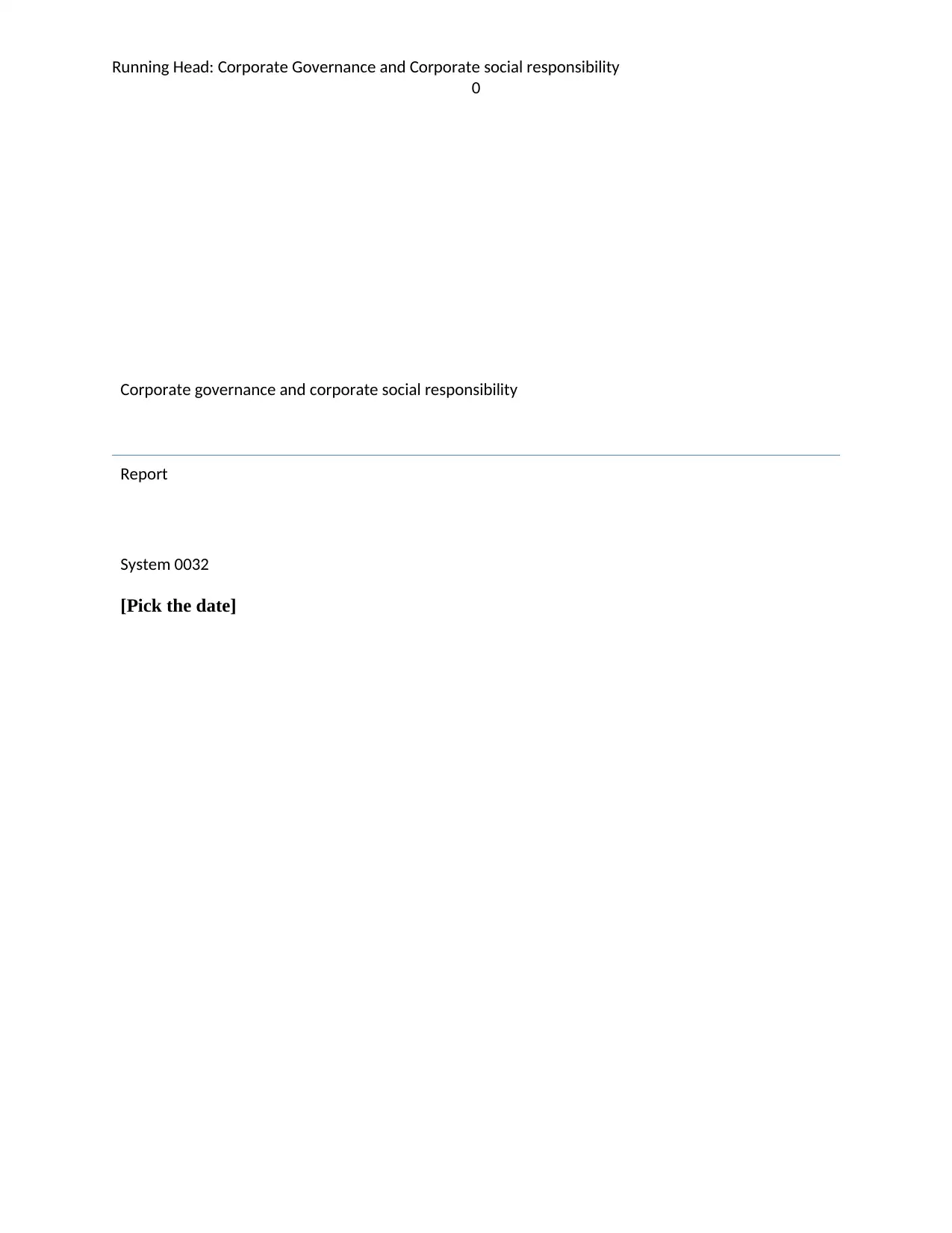
Running Head: Corporate Governance and Corporate social responsibility
0
Corporate governance and corporate social responsibility
Report
System 0032
[Pick the date]
0
Corporate governance and corporate social responsibility
Report
System 0032
[Pick the date]
Paraphrase This Document
Need a fresh take? Get an instant paraphrase of this document with our AI Paraphraser
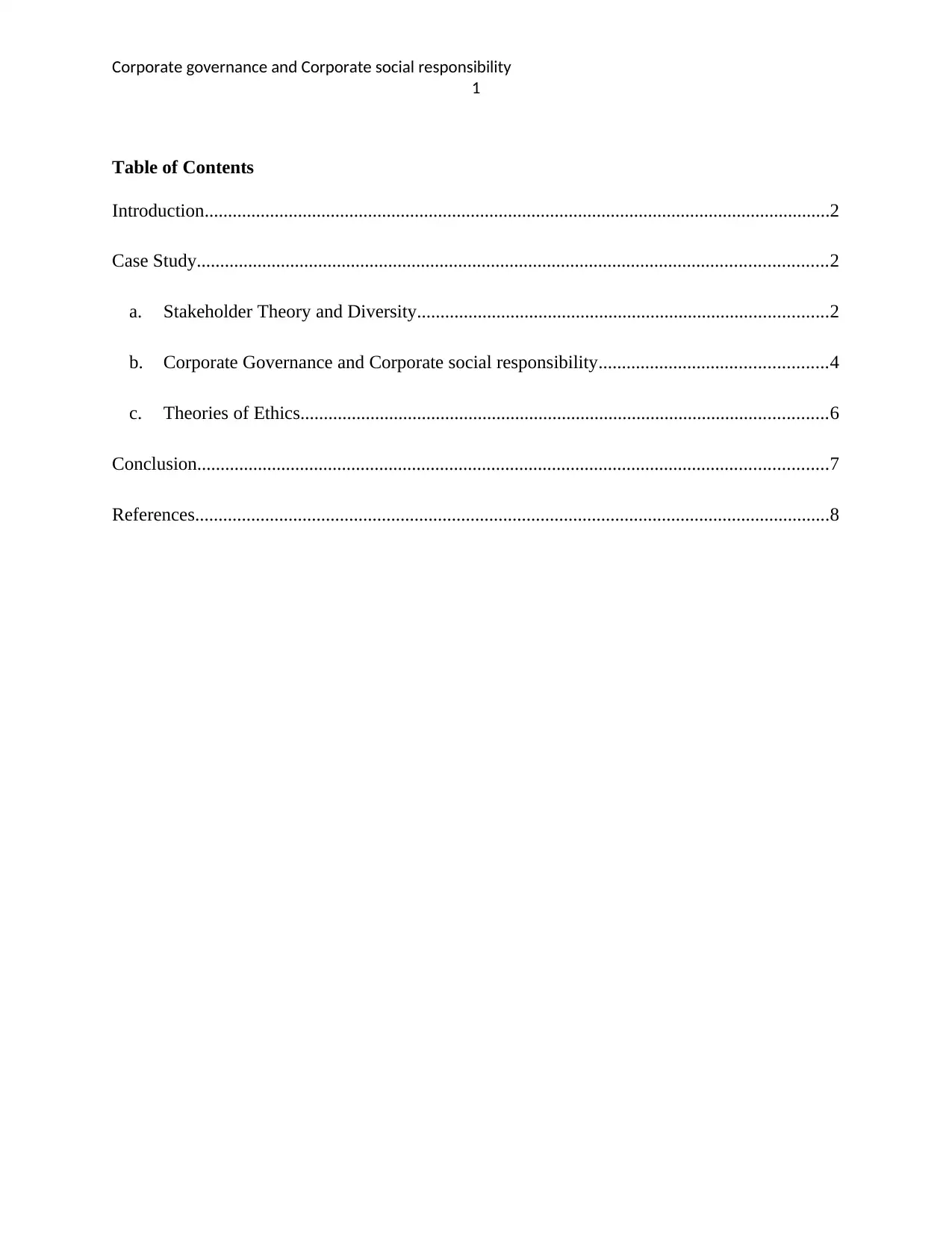
Corporate governance and Corporate social responsibility
1
Table of Contents
Introduction......................................................................................................................................2
Case Study.......................................................................................................................................2
a. Stakeholder Theory and Diversity........................................................................................2
b. Corporate Governance and Corporate social responsibility.................................................4
c. Theories of Ethics.................................................................................................................6
Conclusion.......................................................................................................................................7
References........................................................................................................................................8
1
Table of Contents
Introduction......................................................................................................................................2
Case Study.......................................................................................................................................2
a. Stakeholder Theory and Diversity........................................................................................2
b. Corporate Governance and Corporate social responsibility.................................................4
c. Theories of Ethics.................................................................................................................6
Conclusion.......................................................................................................................................7
References........................................................................................................................................8
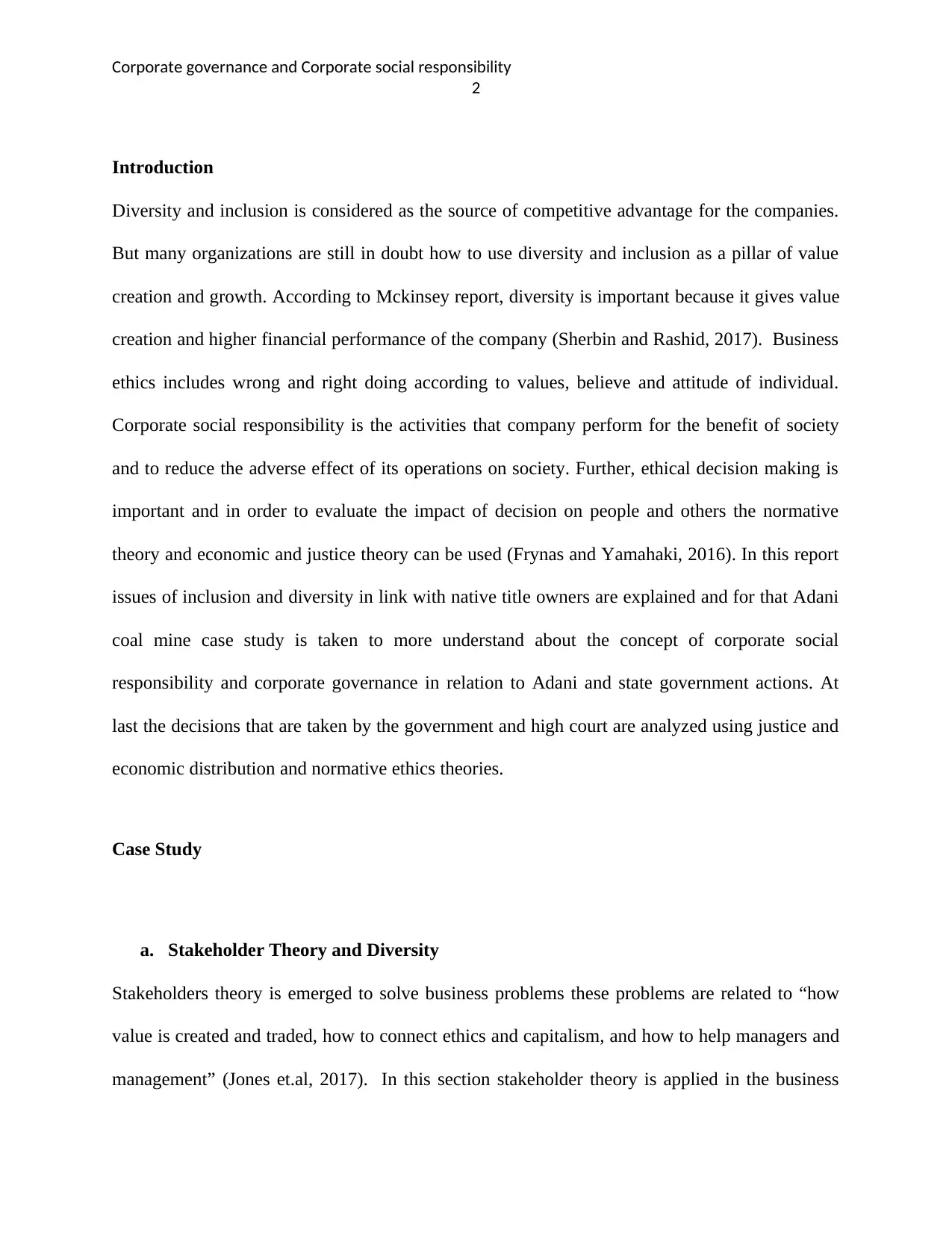
Corporate governance and Corporate social responsibility
2
Introduction
Diversity and inclusion is considered as the source of competitive advantage for the companies.
But many organizations are still in doubt how to use diversity and inclusion as a pillar of value
creation and growth. According to Mckinsey report, diversity is important because it gives value
creation and higher financial performance of the company (Sherbin and Rashid, 2017). Business
ethics includes wrong and right doing according to values, believe and attitude of individual.
Corporate social responsibility is the activities that company perform for the benefit of society
and to reduce the adverse effect of its operations on society. Further, ethical decision making is
important and in order to evaluate the impact of decision on people and others the normative
theory and economic and justice theory can be used (Frynas and Yamahaki, 2016). In this report
issues of inclusion and diversity in link with native title owners are explained and for that Adani
coal mine case study is taken to more understand about the concept of corporate social
responsibility and corporate governance in relation to Adani and state government actions. At
last the decisions that are taken by the government and high court are analyzed using justice and
economic distribution and normative ethics theories.
Case Study
a. Stakeholder Theory and Diversity
Stakeholders theory is emerged to solve business problems these problems are related to “how
value is created and traded, how to connect ethics and capitalism, and how to help managers and
management” (Jones et.al, 2017). In this section stakeholder theory is applied in the business
2
Introduction
Diversity and inclusion is considered as the source of competitive advantage for the companies.
But many organizations are still in doubt how to use diversity and inclusion as a pillar of value
creation and growth. According to Mckinsey report, diversity is important because it gives value
creation and higher financial performance of the company (Sherbin and Rashid, 2017). Business
ethics includes wrong and right doing according to values, believe and attitude of individual.
Corporate social responsibility is the activities that company perform for the benefit of society
and to reduce the adverse effect of its operations on society. Further, ethical decision making is
important and in order to evaluate the impact of decision on people and others the normative
theory and economic and justice theory can be used (Frynas and Yamahaki, 2016). In this report
issues of inclusion and diversity in link with native title owners are explained and for that Adani
coal mine case study is taken to more understand about the concept of corporate social
responsibility and corporate governance in relation to Adani and state government actions. At
last the decisions that are taken by the government and high court are analyzed using justice and
economic distribution and normative ethics theories.
Case Study
a. Stakeholder Theory and Diversity
Stakeholders theory is emerged to solve business problems these problems are related to “how
value is created and traded, how to connect ethics and capitalism, and how to help managers and
management” (Jones et.al, 2017). In this section stakeholder theory is applied in the business
⊘ This is a preview!⊘
Do you want full access?
Subscribe today to unlock all pages.

Trusted by 1+ million students worldwide
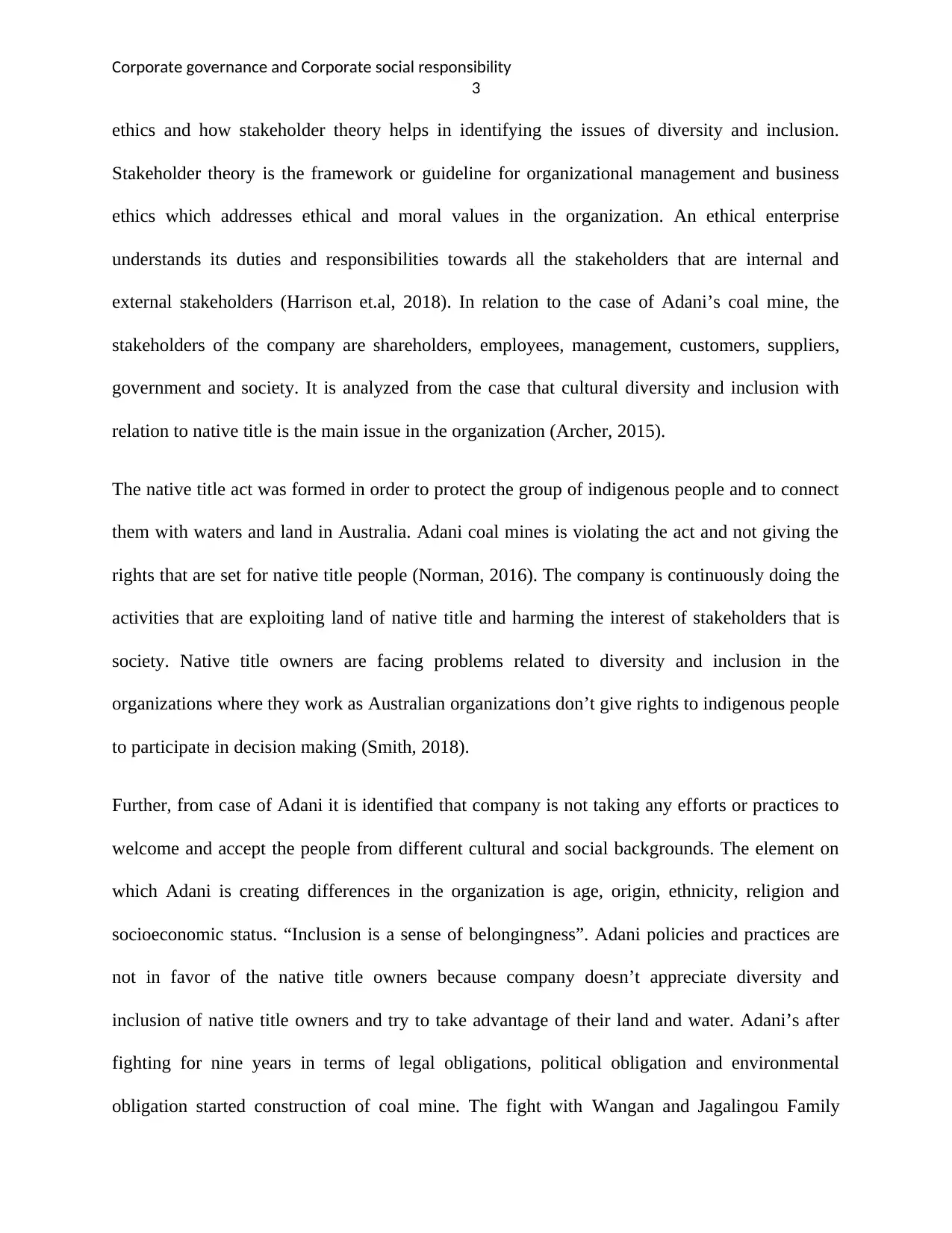
Corporate governance and Corporate social responsibility
3
ethics and how stakeholder theory helps in identifying the issues of diversity and inclusion.
Stakeholder theory is the framework or guideline for organizational management and business
ethics which addresses ethical and moral values in the organization. An ethical enterprise
understands its duties and responsibilities towards all the stakeholders that are internal and
external stakeholders (Harrison et.al, 2018). In relation to the case of Adani’s coal mine, the
stakeholders of the company are shareholders, employees, management, customers, suppliers,
government and society. It is analyzed from the case that cultural diversity and inclusion with
relation to native title is the main issue in the organization (Archer, 2015).
The native title act was formed in order to protect the group of indigenous people and to connect
them with waters and land in Australia. Adani coal mines is violating the act and not giving the
rights that are set for native title people (Norman, 2016). The company is continuously doing the
activities that are exploiting land of native title and harming the interest of stakeholders that is
society. Native title owners are facing problems related to diversity and inclusion in the
organizations where they work as Australian organizations don’t give rights to indigenous people
to participate in decision making (Smith, 2018).
Further, from case of Adani it is identified that company is not taking any efforts or practices to
welcome and accept the people from different cultural and social backgrounds. The element on
which Adani is creating differences in the organization is age, origin, ethnicity, religion and
socioeconomic status. “Inclusion is a sense of belongingness”. Adani policies and practices are
not in favor of the native title owners because company doesn’t appreciate diversity and
inclusion of native title owners and try to take advantage of their land and water. Adani’s after
fighting for nine years in terms of legal obligations, political obligation and environmental
obligation started construction of coal mine. The fight with Wangan and Jagalingou Family
3
ethics and how stakeholder theory helps in identifying the issues of diversity and inclusion.
Stakeholder theory is the framework or guideline for organizational management and business
ethics which addresses ethical and moral values in the organization. An ethical enterprise
understands its duties and responsibilities towards all the stakeholders that are internal and
external stakeholders (Harrison et.al, 2018). In relation to the case of Adani’s coal mine, the
stakeholders of the company are shareholders, employees, management, customers, suppliers,
government and society. It is analyzed from the case that cultural diversity and inclusion with
relation to native title is the main issue in the organization (Archer, 2015).
The native title act was formed in order to protect the group of indigenous people and to connect
them with waters and land in Australia. Adani coal mines is violating the act and not giving the
rights that are set for native title people (Norman, 2016). The company is continuously doing the
activities that are exploiting land of native title and harming the interest of stakeholders that is
society. Native title owners are facing problems related to diversity and inclusion in the
organizations where they work as Australian organizations don’t give rights to indigenous people
to participate in decision making (Smith, 2018).
Further, from case of Adani it is identified that company is not taking any efforts or practices to
welcome and accept the people from different cultural and social backgrounds. The element on
which Adani is creating differences in the organization is age, origin, ethnicity, religion and
socioeconomic status. “Inclusion is a sense of belongingness”. Adani policies and practices are
not in favor of the native title owners because company doesn’t appreciate diversity and
inclusion of native title owners and try to take advantage of their land and water. Adani’s after
fighting for nine years in terms of legal obligations, political obligation and environmental
obligation started construction of coal mine. The fight with Wangan and Jagalingou Family
Paraphrase This Document
Need a fresh take? Get an instant paraphrase of this document with our AI Paraphraser
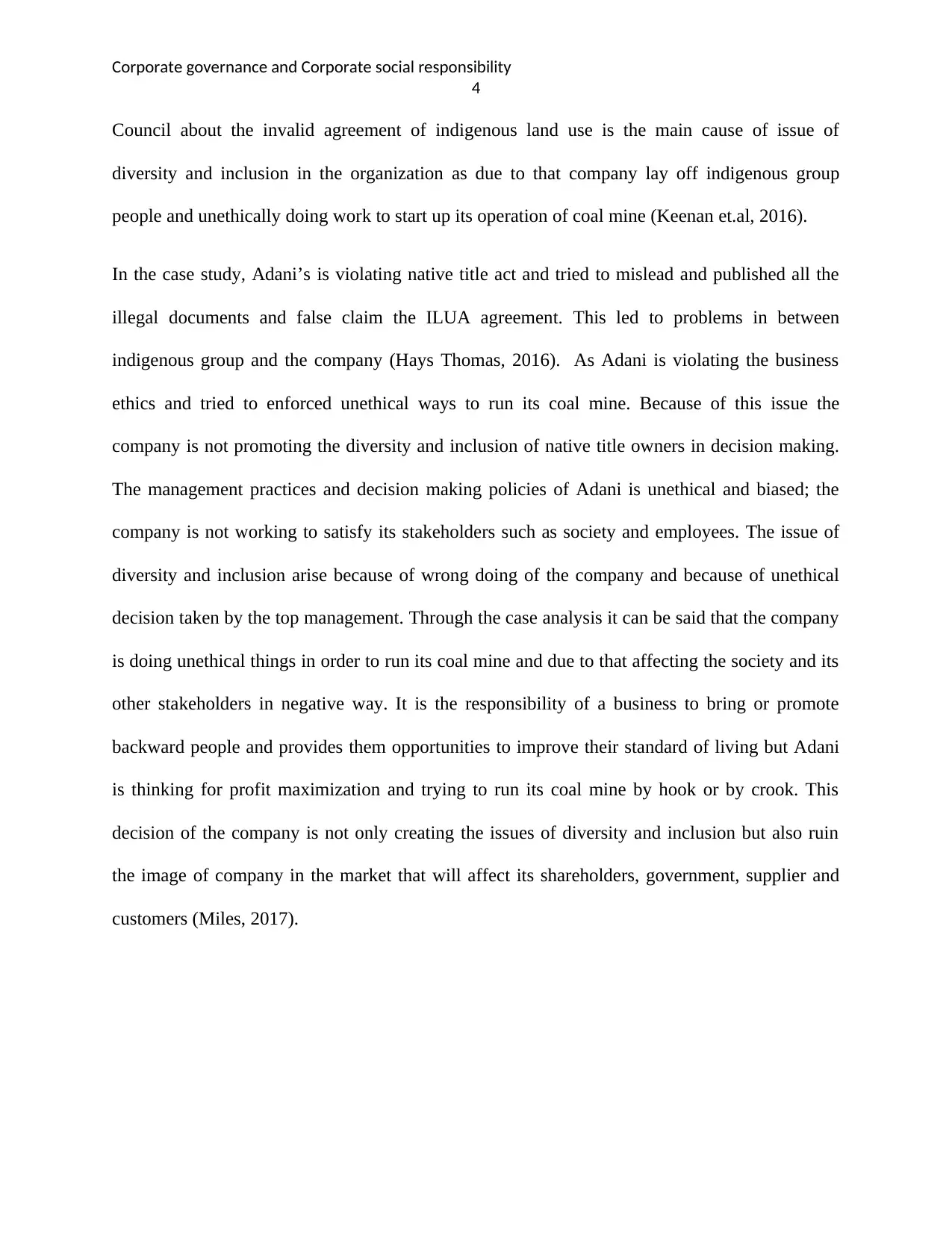
Corporate governance and Corporate social responsibility
4
Council about the invalid agreement of indigenous land use is the main cause of issue of
diversity and inclusion in the organization as due to that company lay off indigenous group
people and unethically doing work to start up its operation of coal mine (Keenan et.al, 2016).
In the case study, Adani’s is violating native title act and tried to mislead and published all the
illegal documents and false claim the ILUA agreement. This led to problems in between
indigenous group and the company (Hays Thomas, 2016). As Adani is violating the business
ethics and tried to enforced unethical ways to run its coal mine. Because of this issue the
company is not promoting the diversity and inclusion of native title owners in decision making.
The management practices and decision making policies of Adani is unethical and biased; the
company is not working to satisfy its stakeholders such as society and employees. The issue of
diversity and inclusion arise because of wrong doing of the company and because of unethical
decision taken by the top management. Through the case analysis it can be said that the company
is doing unethical things in order to run its coal mine and due to that affecting the society and its
other stakeholders in negative way. It is the responsibility of a business to bring or promote
backward people and provides them opportunities to improve their standard of living but Adani
is thinking for profit maximization and trying to run its coal mine by hook or by crook. This
decision of the company is not only creating the issues of diversity and inclusion but also ruin
the image of company in the market that will affect its shareholders, government, supplier and
customers (Miles, 2017).
4
Council about the invalid agreement of indigenous land use is the main cause of issue of
diversity and inclusion in the organization as due to that company lay off indigenous group
people and unethically doing work to start up its operation of coal mine (Keenan et.al, 2016).
In the case study, Adani’s is violating native title act and tried to mislead and published all the
illegal documents and false claim the ILUA agreement. This led to problems in between
indigenous group and the company (Hays Thomas, 2016). As Adani is violating the business
ethics and tried to enforced unethical ways to run its coal mine. Because of this issue the
company is not promoting the diversity and inclusion of native title owners in decision making.
The management practices and decision making policies of Adani is unethical and biased; the
company is not working to satisfy its stakeholders such as society and employees. The issue of
diversity and inclusion arise because of wrong doing of the company and because of unethical
decision taken by the top management. Through the case analysis it can be said that the company
is doing unethical things in order to run its coal mine and due to that affecting the society and its
other stakeholders in negative way. It is the responsibility of a business to bring or promote
backward people and provides them opportunities to improve their standard of living but Adani
is thinking for profit maximization and trying to run its coal mine by hook or by crook. This
decision of the company is not only creating the issues of diversity and inclusion but also ruin
the image of company in the market that will affect its shareholders, government, supplier and
customers (Miles, 2017).
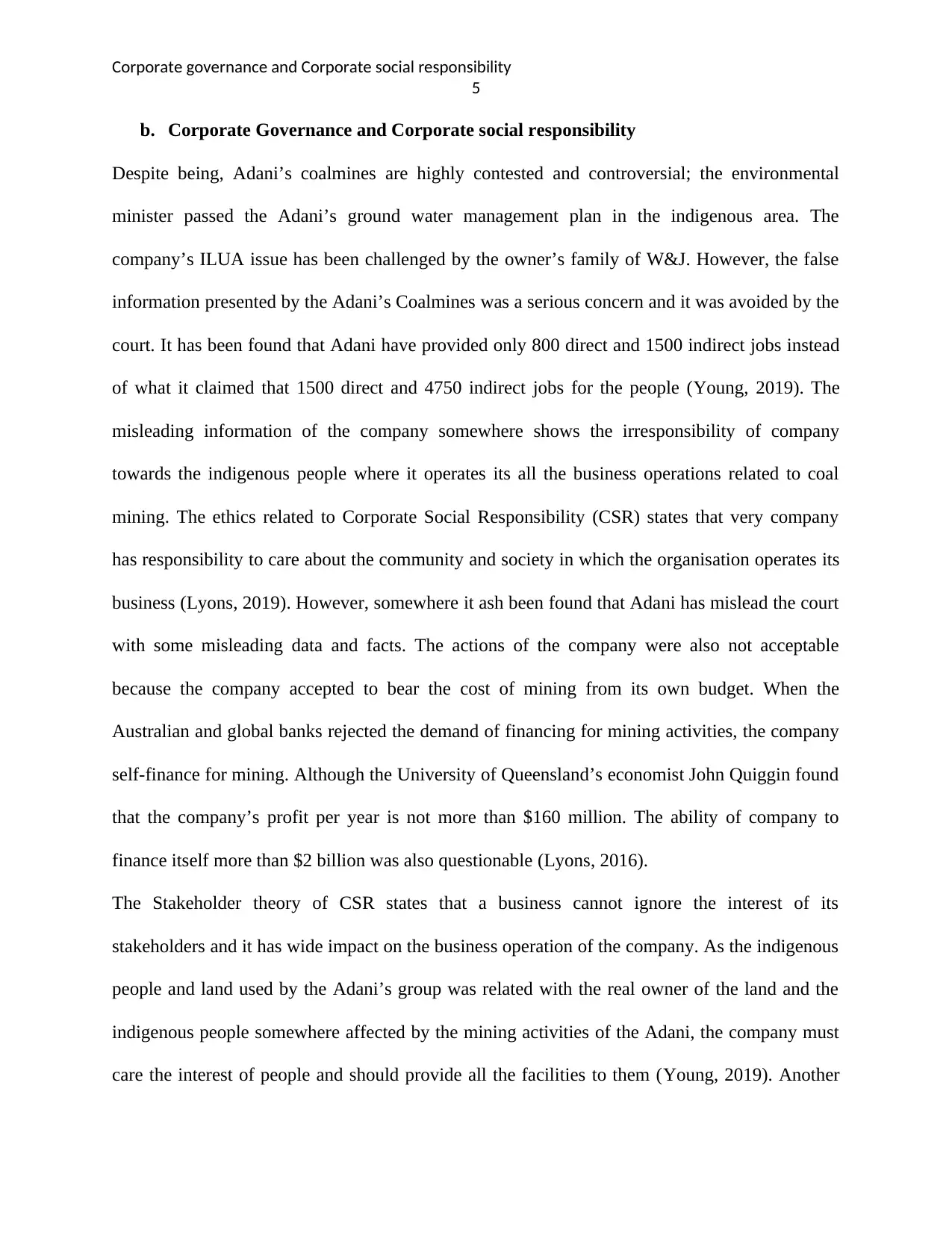
Corporate governance and Corporate social responsibility
5
b. Corporate Governance and Corporate social responsibility
Despite being, Adani’s coalmines are highly contested and controversial; the environmental
minister passed the Adani’s ground water management plan in the indigenous area. The
company’s ILUA issue has been challenged by the owner’s family of W&J. However, the false
information presented by the Adani’s Coalmines was a serious concern and it was avoided by the
court. It has been found that Adani have provided only 800 direct and 1500 indirect jobs instead
of what it claimed that 1500 direct and 4750 indirect jobs for the people (Young, 2019). The
misleading information of the company somewhere shows the irresponsibility of company
towards the indigenous people where it operates its all the business operations related to coal
mining. The ethics related to Corporate Social Responsibility (CSR) states that very company
has responsibility to care about the community and society in which the organisation operates its
business (Lyons, 2019). However, somewhere it ash been found that Adani has mislead the court
with some misleading data and facts. The actions of the company were also not acceptable
because the company accepted to bear the cost of mining from its own budget. When the
Australian and global banks rejected the demand of financing for mining activities, the company
self-finance for mining. Although the University of Queensland’s economist John Quiggin found
that the company’s profit per year is not more than $160 million. The ability of company to
finance itself more than $2 billion was also questionable (Lyons, 2016).
The Stakeholder theory of CSR states that a business cannot ignore the interest of its
stakeholders and it has wide impact on the business operation of the company. As the indigenous
people and land used by the Adani’s group was related with the real owner of the land and the
indigenous people somewhere affected by the mining activities of the Adani, the company must
care the interest of people and should provide all the facilities to them (Young, 2019). Another
5
b. Corporate Governance and Corporate social responsibility
Despite being, Adani’s coalmines are highly contested and controversial; the environmental
minister passed the Adani’s ground water management plan in the indigenous area. The
company’s ILUA issue has been challenged by the owner’s family of W&J. However, the false
information presented by the Adani’s Coalmines was a serious concern and it was avoided by the
court. It has been found that Adani have provided only 800 direct and 1500 indirect jobs instead
of what it claimed that 1500 direct and 4750 indirect jobs for the people (Young, 2019). The
misleading information of the company somewhere shows the irresponsibility of company
towards the indigenous people where it operates its all the business operations related to coal
mining. The ethics related to Corporate Social Responsibility (CSR) states that very company
has responsibility to care about the community and society in which the organisation operates its
business (Lyons, 2019). However, somewhere it ash been found that Adani has mislead the court
with some misleading data and facts. The actions of the company were also not acceptable
because the company accepted to bear the cost of mining from its own budget. When the
Australian and global banks rejected the demand of financing for mining activities, the company
self-finance for mining. Although the University of Queensland’s economist John Quiggin found
that the company’s profit per year is not more than $160 million. The ability of company to
finance itself more than $2 billion was also questionable (Lyons, 2016).
The Stakeholder theory of CSR states that a business cannot ignore the interest of its
stakeholders and it has wide impact on the business operation of the company. As the indigenous
people and land used by the Adani’s group was related with the real owner of the land and the
indigenous people somewhere affected by the mining activities of the Adani, the company must
care the interest of people and should provide all the facilities to them (Young, 2019). Another
⊘ This is a preview!⊘
Do you want full access?
Subscribe today to unlock all pages.

Trusted by 1+ million students worldwide
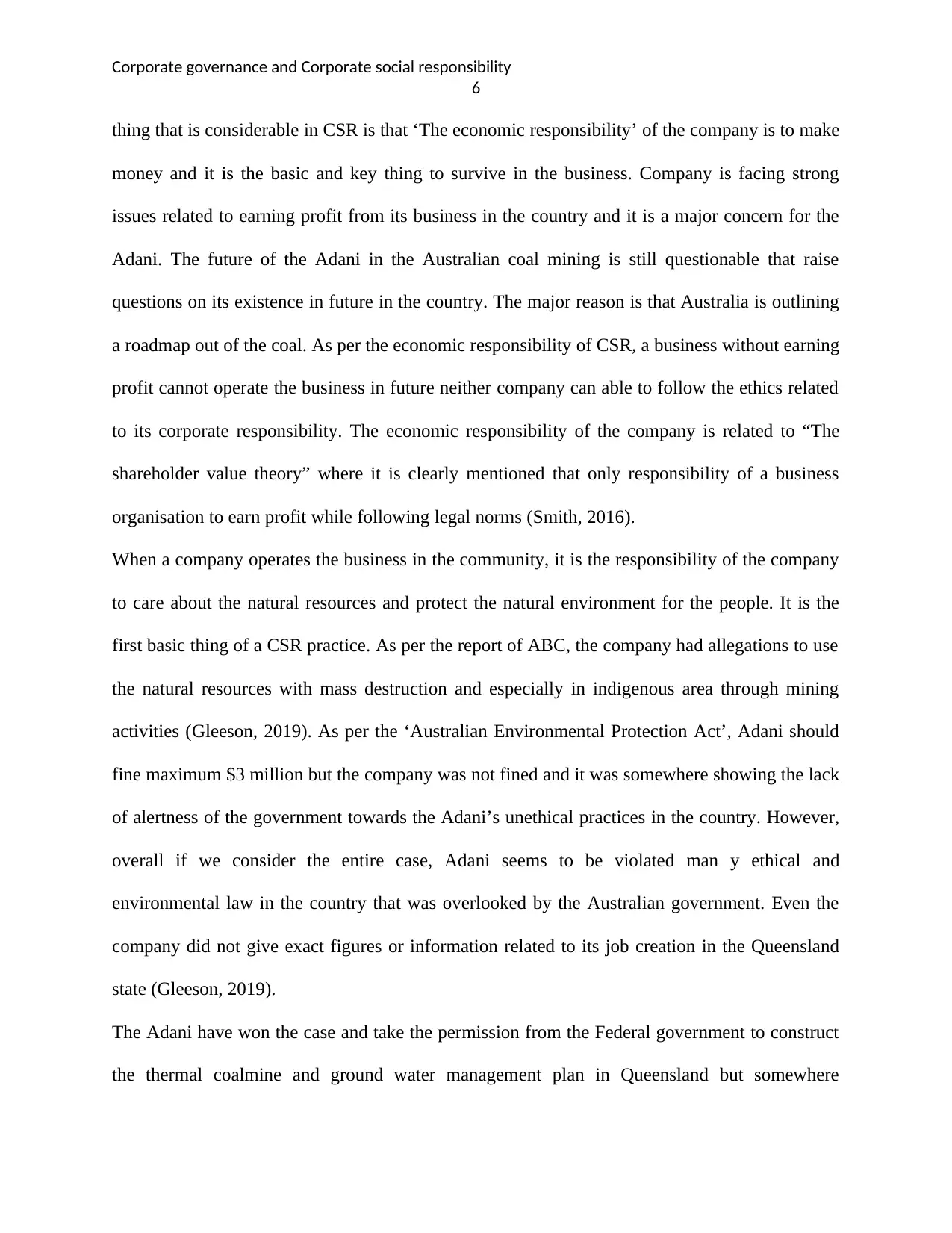
Corporate governance and Corporate social responsibility
6
thing that is considerable in CSR is that ‘The economic responsibility’ of the company is to make
money and it is the basic and key thing to survive in the business. Company is facing strong
issues related to earning profit from its business in the country and it is a major concern for the
Adani. The future of the Adani in the Australian coal mining is still questionable that raise
questions on its existence in future in the country. The major reason is that Australia is outlining
a roadmap out of the coal. As per the economic responsibility of CSR, a business without earning
profit cannot operate the business in future neither company can able to follow the ethics related
to its corporate responsibility. The economic responsibility of the company is related to “The
shareholder value theory” where it is clearly mentioned that only responsibility of a business
organisation to earn profit while following legal norms (Smith, 2016).
When a company operates the business in the community, it is the responsibility of the company
to care about the natural resources and protect the natural environment for the people. It is the
first basic thing of a CSR practice. As per the report of ABC, the company had allegations to use
the natural resources with mass destruction and especially in indigenous area through mining
activities (Gleeson, 2019). As per the ‘Australian Environmental Protection Act’, Adani should
fine maximum $3 million but the company was not fined and it was somewhere showing the lack
of alertness of the government towards the Adani’s unethical practices in the country. However,
overall if we consider the entire case, Adani seems to be violated man y ethical and
environmental law in the country that was overlooked by the Australian government. Even the
company did not give exact figures or information related to its job creation in the Queensland
state (Gleeson, 2019).
The Adani have won the case and take the permission from the Federal government to construct
the thermal coalmine and ground water management plan in Queensland but somewhere
6
thing that is considerable in CSR is that ‘The economic responsibility’ of the company is to make
money and it is the basic and key thing to survive in the business. Company is facing strong
issues related to earning profit from its business in the country and it is a major concern for the
Adani. The future of the Adani in the Australian coal mining is still questionable that raise
questions on its existence in future in the country. The major reason is that Australia is outlining
a roadmap out of the coal. As per the economic responsibility of CSR, a business without earning
profit cannot operate the business in future neither company can able to follow the ethics related
to its corporate responsibility. The economic responsibility of the company is related to “The
shareholder value theory” where it is clearly mentioned that only responsibility of a business
organisation to earn profit while following legal norms (Smith, 2016).
When a company operates the business in the community, it is the responsibility of the company
to care about the natural resources and protect the natural environment for the people. It is the
first basic thing of a CSR practice. As per the report of ABC, the company had allegations to use
the natural resources with mass destruction and especially in indigenous area through mining
activities (Gleeson, 2019). As per the ‘Australian Environmental Protection Act’, Adani should
fine maximum $3 million but the company was not fined and it was somewhere showing the lack
of alertness of the government towards the Adani’s unethical practices in the country. However,
overall if we consider the entire case, Adani seems to be violated man y ethical and
environmental law in the country that was overlooked by the Australian government. Even the
company did not give exact figures or information related to its job creation in the Queensland
state (Gleeson, 2019).
The Adani have won the case and take the permission from the Federal government to construct
the thermal coalmine and ground water management plan in Queensland but somewhere
Paraphrase This Document
Need a fresh take? Get an instant paraphrase of this document with our AI Paraphraser
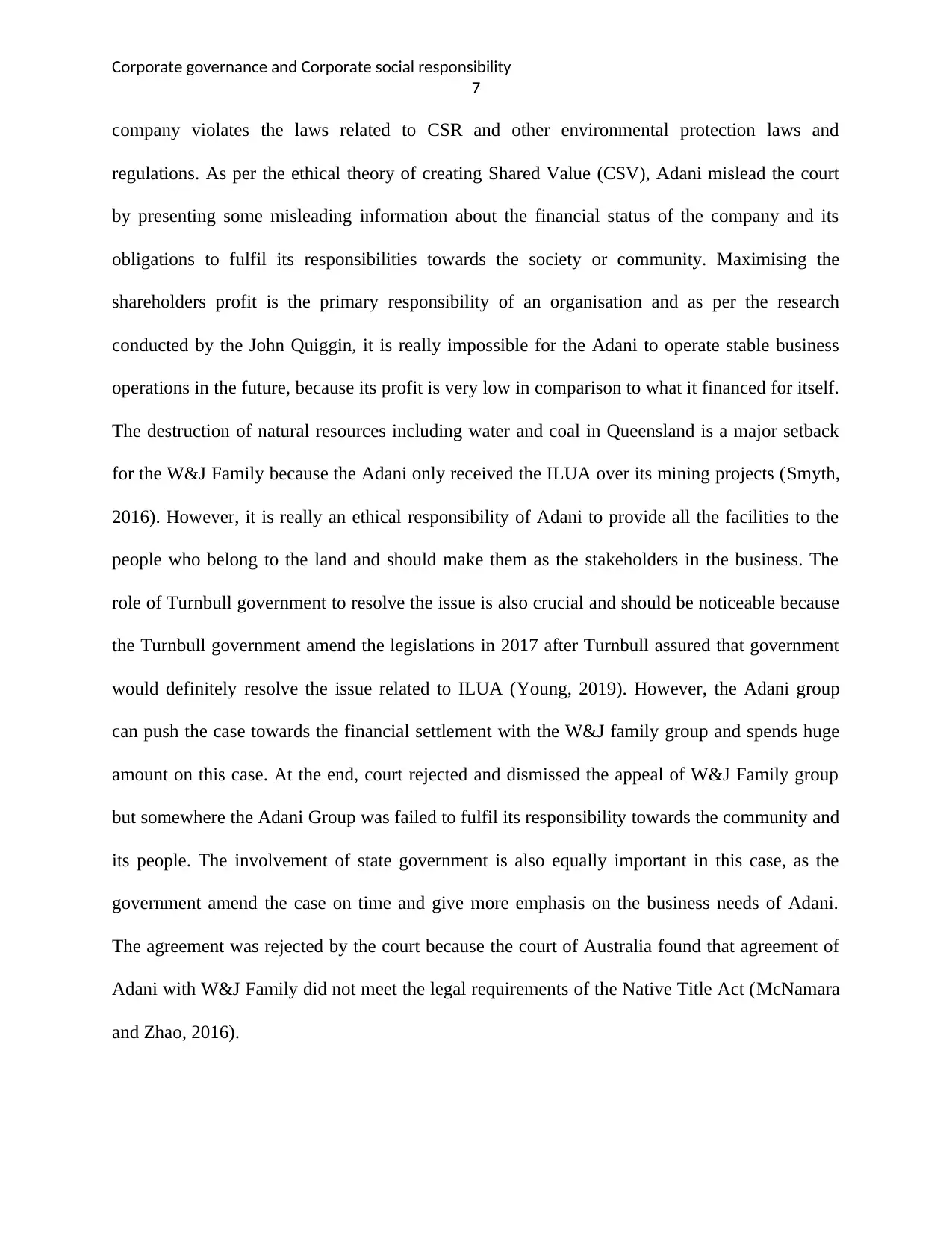
Corporate governance and Corporate social responsibility
7
company violates the laws related to CSR and other environmental protection laws and
regulations. As per the ethical theory of creating Shared Value (CSV), Adani mislead the court
by presenting some misleading information about the financial status of the company and its
obligations to fulfil its responsibilities towards the society or community. Maximising the
shareholders profit is the primary responsibility of an organisation and as per the research
conducted by the John Quiggin, it is really impossible for the Adani to operate stable business
operations in the future, because its profit is very low in comparison to what it financed for itself.
The destruction of natural resources including water and coal in Queensland is a major setback
for the W&J Family because the Adani only received the ILUA over its mining projects (Smyth,
2016). However, it is really an ethical responsibility of Adani to provide all the facilities to the
people who belong to the land and should make them as the stakeholders in the business. The
role of Turnbull government to resolve the issue is also crucial and should be noticeable because
the Turnbull government amend the legislations in 2017 after Turnbull assured that government
would definitely resolve the issue related to ILUA (Young, 2019). However, the Adani group
can push the case towards the financial settlement with the W&J family group and spends huge
amount on this case. At the end, court rejected and dismissed the appeal of W&J Family group
but somewhere the Adani Group was failed to fulfil its responsibility towards the community and
its people. The involvement of state government is also equally important in this case, as the
government amend the case on time and give more emphasis on the business needs of Adani.
The agreement was rejected by the court because the court of Australia found that agreement of
Adani with W&J Family did not meet the legal requirements of the Native Title Act (McNamara
and Zhao, 2016).
7
company violates the laws related to CSR and other environmental protection laws and
regulations. As per the ethical theory of creating Shared Value (CSV), Adani mislead the court
by presenting some misleading information about the financial status of the company and its
obligations to fulfil its responsibilities towards the society or community. Maximising the
shareholders profit is the primary responsibility of an organisation and as per the research
conducted by the John Quiggin, it is really impossible for the Adani to operate stable business
operations in the future, because its profit is very low in comparison to what it financed for itself.
The destruction of natural resources including water and coal in Queensland is a major setback
for the W&J Family because the Adani only received the ILUA over its mining projects (Smyth,
2016). However, it is really an ethical responsibility of Adani to provide all the facilities to the
people who belong to the land and should make them as the stakeholders in the business. The
role of Turnbull government to resolve the issue is also crucial and should be noticeable because
the Turnbull government amend the legislations in 2017 after Turnbull assured that government
would definitely resolve the issue related to ILUA (Young, 2019). However, the Adani group
can push the case towards the financial settlement with the W&J family group and spends huge
amount on this case. At the end, court rejected and dismissed the appeal of W&J Family group
but somewhere the Adani Group was failed to fulfil its responsibility towards the community and
its people. The involvement of state government is also equally important in this case, as the
government amend the case on time and give more emphasis on the business needs of Adani.
The agreement was rejected by the court because the court of Australia found that agreement of
Adani with W&J Family did not meet the legal requirements of the Native Title Act (McNamara
and Zhao, 2016).
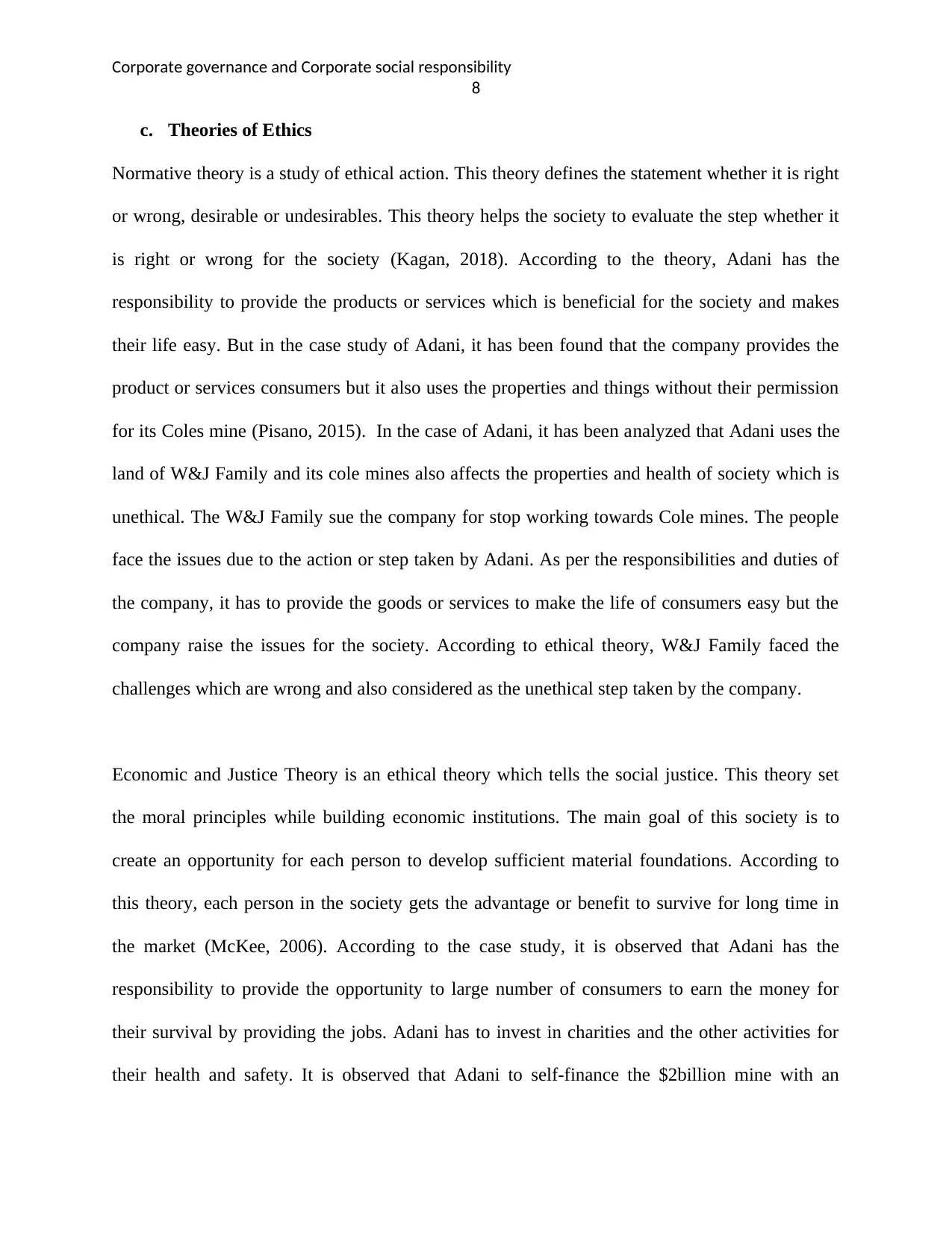
Corporate governance and Corporate social responsibility
8
c. Theories of Ethics
Normative theory is a study of ethical action. This theory defines the statement whether it is right
or wrong, desirable or undesirables. This theory helps the society to evaluate the step whether it
is right or wrong for the society (Kagan, 2018). According to the theory, Adani has the
responsibility to provide the products or services which is beneficial for the society and makes
their life easy. But in the case study of Adani, it has been found that the company provides the
product or services consumers but it also uses the properties and things without their permission
for its Coles mine (Pisano, 2015). In the case of Adani, it has been analyzed that Adani uses the
land of W&J Family and its cole mines also affects the properties and health of society which is
unethical. The W&J Family sue the company for stop working towards Cole mines. The people
face the issues due to the action or step taken by Adani. As per the responsibilities and duties of
the company, it has to provide the goods or services to make the life of consumers easy but the
company raise the issues for the society. According to ethical theory, W&J Family faced the
challenges which are wrong and also considered as the unethical step taken by the company.
Economic and Justice Theory is an ethical theory which tells the social justice. This theory set
the moral principles while building economic institutions. The main goal of this society is to
create an opportunity for each person to develop sufficient material foundations. According to
this theory, each person in the society gets the advantage or benefit to survive for long time in
the market (McKee, 2006). According to the case study, it is observed that Adani has the
responsibility to provide the opportunity to large number of consumers to earn the money for
their survival by providing the jobs. Adani has to invest in charities and the other activities for
their health and safety. It is observed that Adani to self-finance the $2billion mine with an
8
c. Theories of Ethics
Normative theory is a study of ethical action. This theory defines the statement whether it is right
or wrong, desirable or undesirables. This theory helps the society to evaluate the step whether it
is right or wrong for the society (Kagan, 2018). According to the theory, Adani has the
responsibility to provide the products or services which is beneficial for the society and makes
their life easy. But in the case study of Adani, it has been found that the company provides the
product or services consumers but it also uses the properties and things without their permission
for its Coles mine (Pisano, 2015). In the case of Adani, it has been analyzed that Adani uses the
land of W&J Family and its cole mines also affects the properties and health of society which is
unethical. The W&J Family sue the company for stop working towards Cole mines. The people
face the issues due to the action or step taken by Adani. As per the responsibilities and duties of
the company, it has to provide the goods or services to make the life of consumers easy but the
company raise the issues for the society. According to ethical theory, W&J Family faced the
challenges which are wrong and also considered as the unethical step taken by the company.
Economic and Justice Theory is an ethical theory which tells the social justice. This theory set
the moral principles while building economic institutions. The main goal of this society is to
create an opportunity for each person to develop sufficient material foundations. According to
this theory, each person in the society gets the advantage or benefit to survive for long time in
the market (McKee, 2006). According to the case study, it is observed that Adani has the
responsibility to provide the opportunity to large number of consumers to earn the money for
their survival by providing the jobs. Adani has to invest in charities and the other activities for
their health and safety. It is observed that Adani to self-finance the $2billion mine with an
⊘ This is a preview!⊘
Do you want full access?
Subscribe today to unlock all pages.

Trusted by 1+ million students worldwide
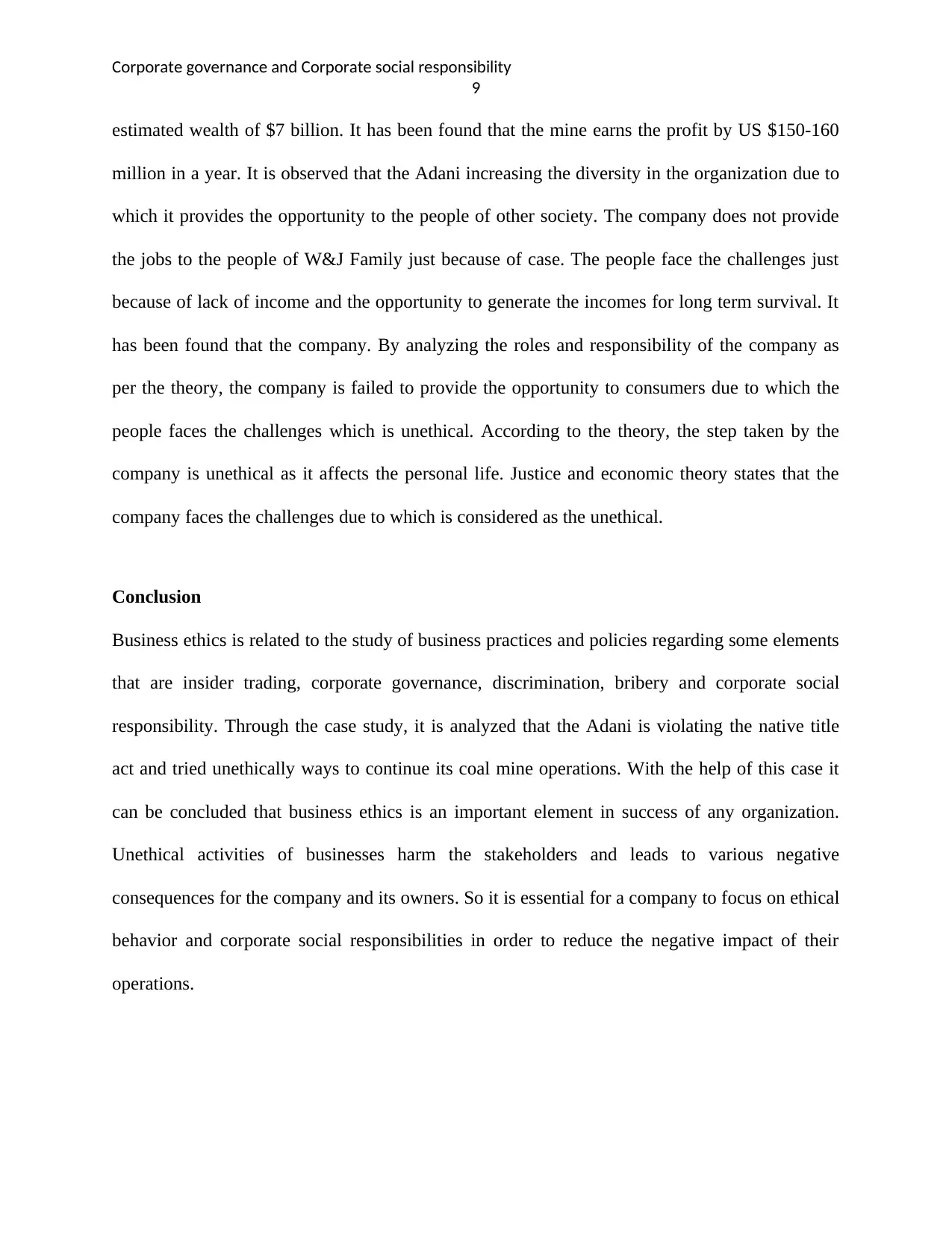
Corporate governance and Corporate social responsibility
9
estimated wealth of $7 billion. It has been found that the mine earns the profit by US $150-160
million in a year. It is observed that the Adani increasing the diversity in the organization due to
which it provides the opportunity to the people of other society. The company does not provide
the jobs to the people of W&J Family just because of case. The people face the challenges just
because of lack of income and the opportunity to generate the incomes for long term survival. It
has been found that the company. By analyzing the roles and responsibility of the company as
per the theory, the company is failed to provide the opportunity to consumers due to which the
people faces the challenges which is unethical. According to the theory, the step taken by the
company is unethical as it affects the personal life. Justice and economic theory states that the
company faces the challenges due to which is considered as the unethical.
Conclusion
Business ethics is related to the study of business practices and policies regarding some elements
that are insider trading, corporate governance, discrimination, bribery and corporate social
responsibility. Through the case study, it is analyzed that the Adani is violating the native title
act and tried unethically ways to continue its coal mine operations. With the help of this case it
can be concluded that business ethics is an important element in success of any organization.
Unethical activities of businesses harm the stakeholders and leads to various negative
consequences for the company and its owners. So it is essential for a company to focus on ethical
behavior and corporate social responsibilities in order to reduce the negative impact of their
operations.
9
estimated wealth of $7 billion. It has been found that the mine earns the profit by US $150-160
million in a year. It is observed that the Adani increasing the diversity in the organization due to
which it provides the opportunity to the people of other society. The company does not provide
the jobs to the people of W&J Family just because of case. The people face the challenges just
because of lack of income and the opportunity to generate the incomes for long term survival. It
has been found that the company. By analyzing the roles and responsibility of the company as
per the theory, the company is failed to provide the opportunity to consumers due to which the
people faces the challenges which is unethical. According to the theory, the step taken by the
company is unethical as it affects the personal life. Justice and economic theory states that the
company faces the challenges due to which is considered as the unethical.
Conclusion
Business ethics is related to the study of business practices and policies regarding some elements
that are insider trading, corporate governance, discrimination, bribery and corporate social
responsibility. Through the case study, it is analyzed that the Adani is violating the native title
act and tried unethically ways to continue its coal mine operations. With the help of this case it
can be concluded that business ethics is an important element in success of any organization.
Unethical activities of businesses harm the stakeholders and leads to various negative
consequences for the company and its owners. So it is essential for a company to focus on ethical
behavior and corporate social responsibilities in order to reduce the negative impact of their
operations.
Paraphrase This Document
Need a fresh take? Get an instant paraphrase of this document with our AI Paraphraser
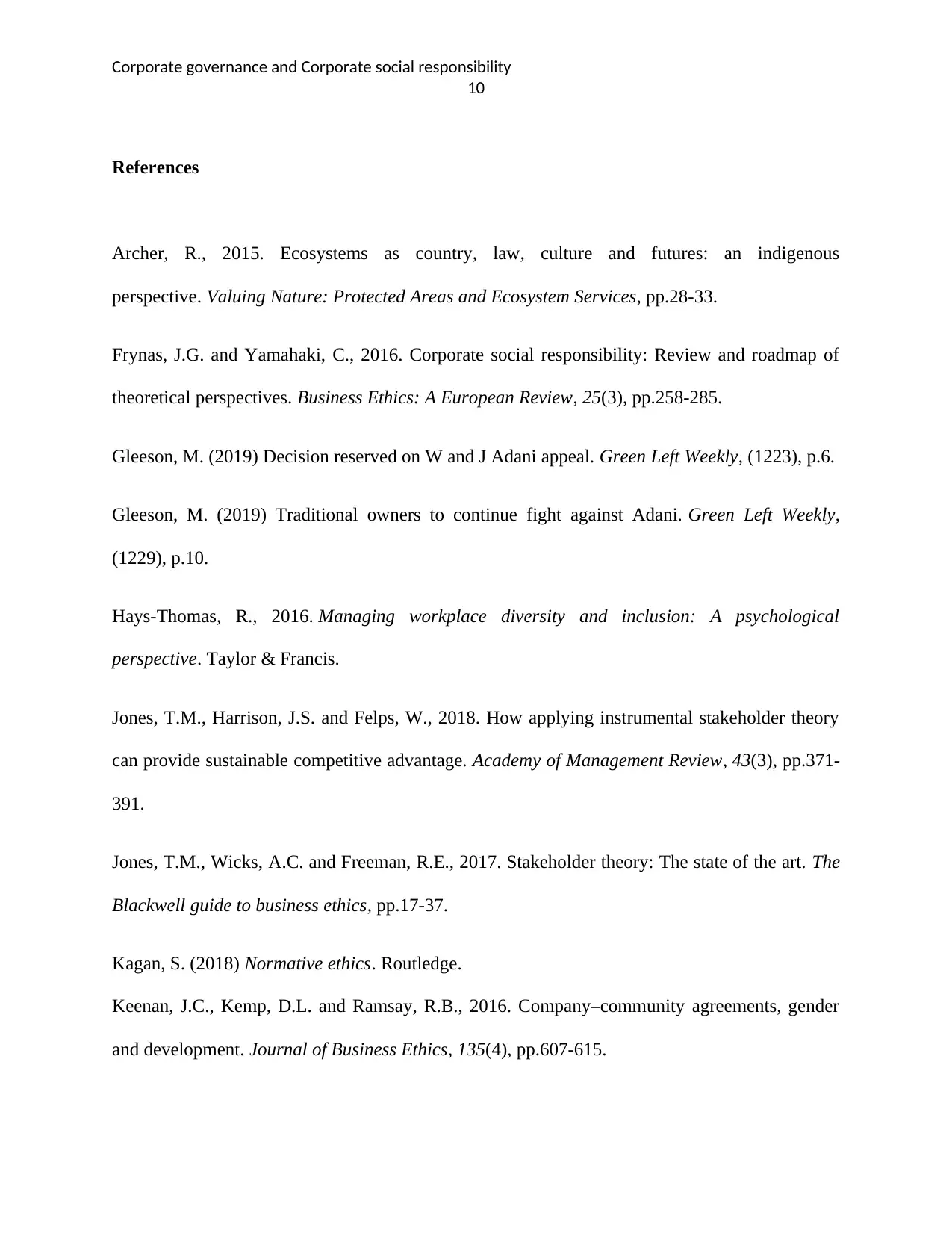
Corporate governance and Corporate social responsibility
10
References
Archer, R., 2015. Ecosystems as country, law, culture and futures: an indigenous
perspective. Valuing Nature: Protected Areas and Ecosystem Services, pp.28-33.
Frynas, J.G. and Yamahaki, C., 2016. Corporate social responsibility: Review and roadmap of
theoretical perspectives. Business Ethics: A European Review, 25(3), pp.258-285.
Gleeson, M. (2019) Decision reserved on W and J Adani appeal. Green Left Weekly, (1223), p.6.
Gleeson, M. (2019) Traditional owners to continue fight against Adani. Green Left Weekly,
(1229), p.10.
Hays-Thomas, R., 2016. Managing workplace diversity and inclusion: A psychological
perspective. Taylor & Francis.
Jones, T.M., Harrison, J.S. and Felps, W., 2018. How applying instrumental stakeholder theory
can provide sustainable competitive advantage. Academy of Management Review, 43(3), pp.371-
391.
Jones, T.M., Wicks, A.C. and Freeman, R.E., 2017. Stakeholder theory: The state of the art. The
Blackwell guide to business ethics, pp.17-37.
Kagan, S. (2018) Normative ethics. Routledge.
Keenan, J.C., Kemp, D.L. and Ramsay, R.B., 2016. Company–community agreements, gender
and development. Journal of Business Ethics, 135(4), pp.607-615.
10
References
Archer, R., 2015. Ecosystems as country, law, culture and futures: an indigenous
perspective. Valuing Nature: Protected Areas and Ecosystem Services, pp.28-33.
Frynas, J.G. and Yamahaki, C., 2016. Corporate social responsibility: Review and roadmap of
theoretical perspectives. Business Ethics: A European Review, 25(3), pp.258-285.
Gleeson, M. (2019) Decision reserved on W and J Adani appeal. Green Left Weekly, (1223), p.6.
Gleeson, M. (2019) Traditional owners to continue fight against Adani. Green Left Weekly,
(1229), p.10.
Hays-Thomas, R., 2016. Managing workplace diversity and inclusion: A psychological
perspective. Taylor & Francis.
Jones, T.M., Harrison, J.S. and Felps, W., 2018. How applying instrumental stakeholder theory
can provide sustainable competitive advantage. Academy of Management Review, 43(3), pp.371-
391.
Jones, T.M., Wicks, A.C. and Freeman, R.E., 2017. Stakeholder theory: The state of the art. The
Blackwell guide to business ethics, pp.17-37.
Kagan, S. (2018) Normative ethics. Routledge.
Keenan, J.C., Kemp, D.L. and Ramsay, R.B., 2016. Company–community agreements, gender
and development. Journal of Business Ethics, 135(4), pp.607-615.
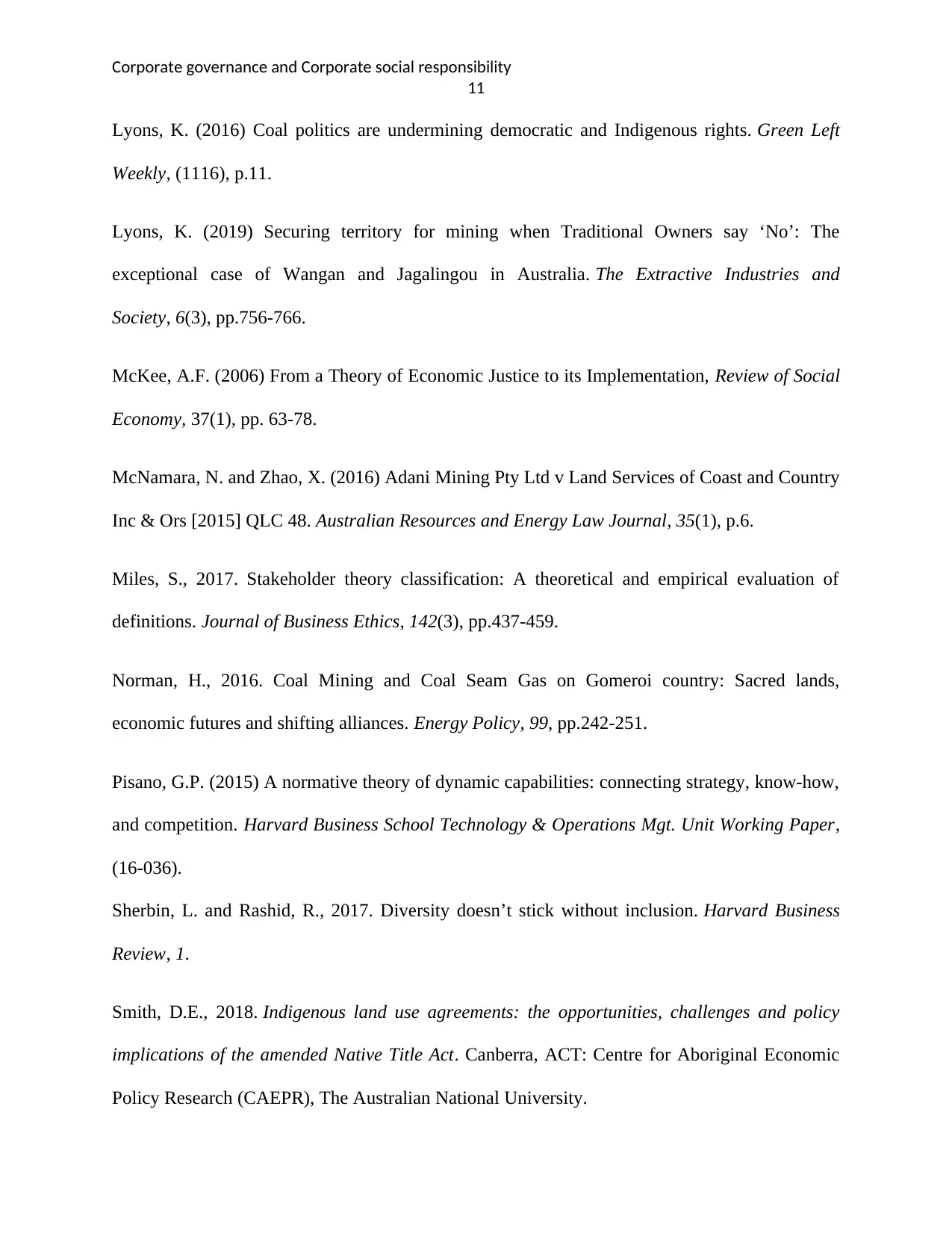
Corporate governance and Corporate social responsibility
11
Lyons, K. (2016) Coal politics are undermining democratic and Indigenous rights. Green Left
Weekly, (1116), p.11.
Lyons, K. (2019) Securing territory for mining when Traditional Owners say ‘No’: The
exceptional case of Wangan and Jagalingou in Australia. The Extractive Industries and
Society, 6(3), pp.756-766.
McKee, A.F. (2006) From a Theory of Economic Justice to its Implementation, Review of Social
Economy, 37(1), pp. 63-78.
McNamara, N. and Zhao, X. (2016) Adani Mining Pty Ltd v Land Services of Coast and Country
Inc & Ors [2015] QLC 48. Australian Resources and Energy Law Journal, 35(1), p.6.
Miles, S., 2017. Stakeholder theory classification: A theoretical and empirical evaluation of
definitions. Journal of Business Ethics, 142(3), pp.437-459.
Norman, H., 2016. Coal Mining and Coal Seam Gas on Gomeroi country: Sacred lands,
economic futures and shifting alliances. Energy Policy, 99, pp.242-251.
Pisano, G.P. (2015) A normative theory of dynamic capabilities: connecting strategy, know-how,
and competition. Harvard Business School Technology & Operations Mgt. Unit Working Paper,
(16-036).
Sherbin, L. and Rashid, R., 2017. Diversity doesn’t stick without inclusion. Harvard Business
Review, 1.
Smith, D.E., 2018. Indigenous land use agreements: the opportunities, challenges and policy
implications of the amended Native Title Act. Canberra, ACT: Centre for Aboriginal Economic
Policy Research (CAEPR), The Australian National University.
11
Lyons, K. (2016) Coal politics are undermining democratic and Indigenous rights. Green Left
Weekly, (1116), p.11.
Lyons, K. (2019) Securing territory for mining when Traditional Owners say ‘No’: The
exceptional case of Wangan and Jagalingou in Australia. The Extractive Industries and
Society, 6(3), pp.756-766.
McKee, A.F. (2006) From a Theory of Economic Justice to its Implementation, Review of Social
Economy, 37(1), pp. 63-78.
McNamara, N. and Zhao, X. (2016) Adani Mining Pty Ltd v Land Services of Coast and Country
Inc & Ors [2015] QLC 48. Australian Resources and Energy Law Journal, 35(1), p.6.
Miles, S., 2017. Stakeholder theory classification: A theoretical and empirical evaluation of
definitions. Journal of Business Ethics, 142(3), pp.437-459.
Norman, H., 2016. Coal Mining and Coal Seam Gas on Gomeroi country: Sacred lands,
economic futures and shifting alliances. Energy Policy, 99, pp.242-251.
Pisano, G.P. (2015) A normative theory of dynamic capabilities: connecting strategy, know-how,
and competition. Harvard Business School Technology & Operations Mgt. Unit Working Paper,
(16-036).
Sherbin, L. and Rashid, R., 2017. Diversity doesn’t stick without inclusion. Harvard Business
Review, 1.
Smith, D.E., 2018. Indigenous land use agreements: the opportunities, challenges and policy
implications of the amended Native Title Act. Canberra, ACT: Centre for Aboriginal Economic
Policy Research (CAEPR), The Australian National University.
⊘ This is a preview!⊘
Do you want full access?
Subscribe today to unlock all pages.

Trusted by 1+ million students worldwide
1 out of 13
Related Documents
Your All-in-One AI-Powered Toolkit for Academic Success.
+13062052269
info@desklib.com
Available 24*7 on WhatsApp / Email
![[object Object]](/_next/static/media/star-bottom.7253800d.svg)
Unlock your academic potential
Copyright © 2020–2026 A2Z Services. All Rights Reserved. Developed and managed by ZUCOL.





